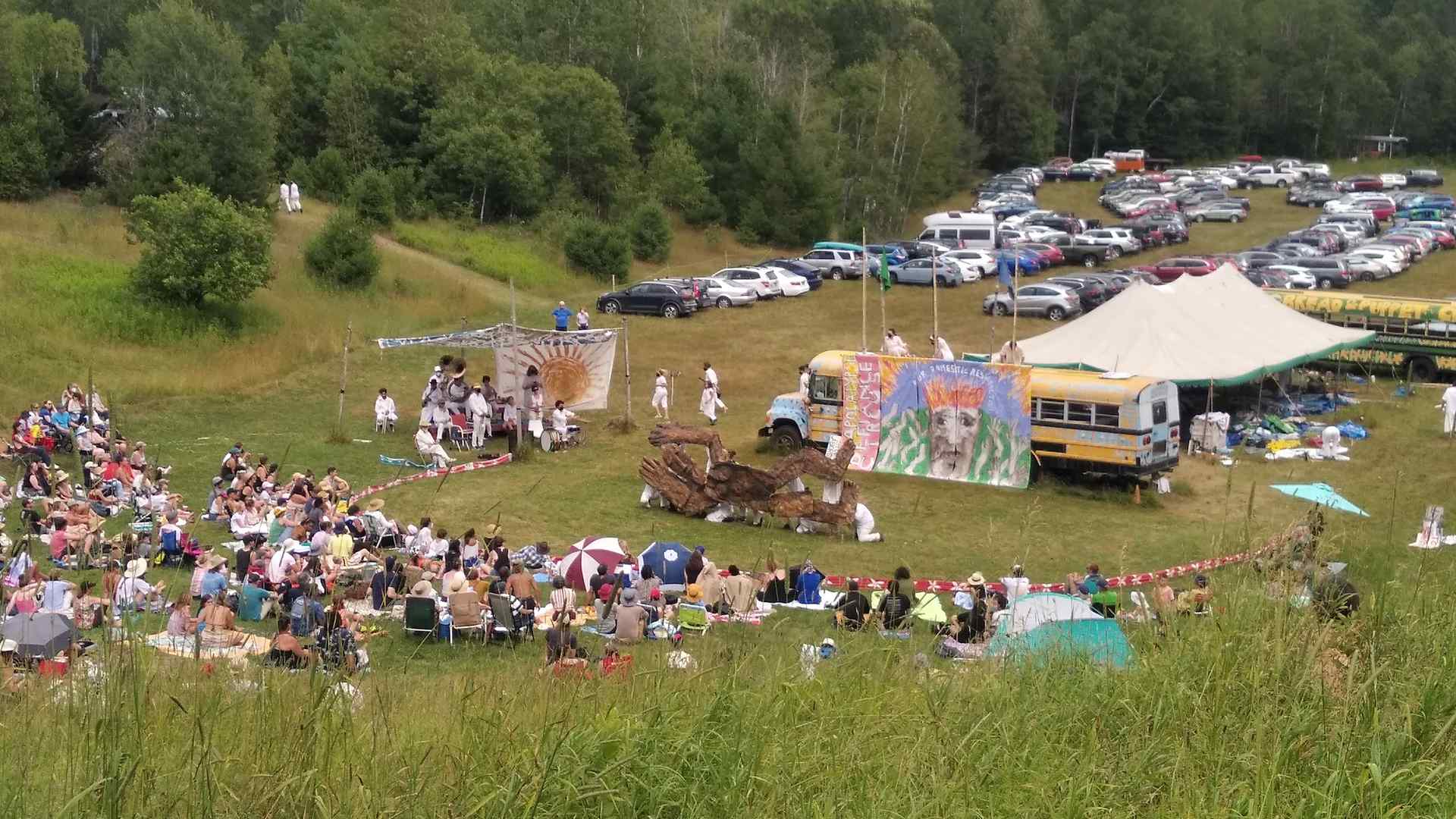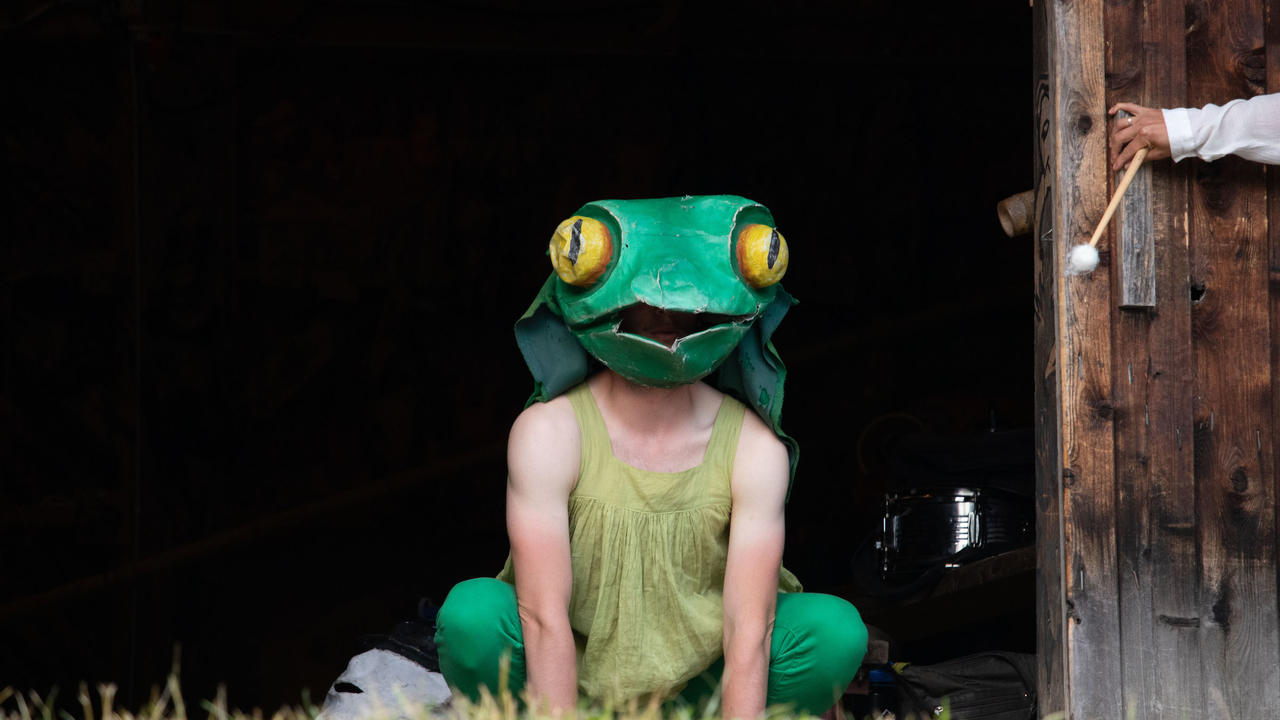
Carl Hallberg had a great source of inspiration when proposing his Student-Initiated Project, part of a series of student-crafted productions performed annually by third-year actors in Juilliard’s Drama Division. After having spent a month over the summer as an apprentice at the venerable Bread and Puppet Theater, Hallberg drew on some of his experiences there to shape his project, The Future of Agriculture, in directorial collaboration with fellow third-year Sam Im. Hannah Rubenstein, artistic programs assistant of the Drama Division, spoke with Hallberg about his summer and how it influenced the project, which will be shared, along with two additional third-year Student-Initiated Projects, with an internal audience in December.
By Hannah Rubenstein
During his summer apprenticeship at Bread and Puppet, third-year drama student Carl Hallberg had the unique opportunity to learn from multiple generations of activists and puppeteers, expand his craft into new mediums, and explore his own artistic aspirations. The theater company was founded on New York City's Lower East Side in 1963 and relocated to an old dairy farm in northern Vermont about a decade later. Over the years, Bread and Puppet has become known throughout the world as a leader in radical political theater and puppetry. Hallberg, one of about two dozen summer apprentices, spent his days building puppets, performing in public parades and other events, doing chores on the farm, swimming in local lakes, making meals with the company, and creating music with the greater Bread and Puppet artistic community.
Particular highlights were the natural environment and collaborative spirit of Bread and Puppet, Hallberg said. He learned alongside puppeteers from Hungary, El Salvador, and South Korea, “each with very distinct puppetry traditions.” Many of the artists in residence were also musicians; live music was a constant presence on the farm. Hallberg, who plays guitar and sings, developed a great deal as a musician over the summer. “I was writing a lot of songs and improvising, and that really cracked something open in me. I was learning from the land and from being around other musicians.”
The summer provided Hallberg with unique experiences, both inspiring—such as the opportunity to explore the farm and his own creative process unencumbered by reliable cell phone service—and challenging. Bread and Puppet has a long-standing tradition of performing in community parades employing puppets that present anti-war and anti-landlord sentiments, created at the height of the counterculture movement. This summer, at one such parade in a conservative town, the company faced the question of how to engage with a community that did not necessarily welcome its political views. “How do you do that in a way that’s not directly adversarial to your audience, and in a way that still lets them in?” Hallberg asked, reflecting on the experience. In the moment, he said, his response was to derive inspiration from his training at Juilliard, citing drama faculty member Kathleen McNenny’s mask class as providing useful tools for maintaining his composure in the face of vocal opposition.

Hallberg, whose participation in the apprenticeship was made possible in part through a Juilliard Project Grant, returned to school this fall with a reinvigorated excitement for acting and a new set of skills to share with his fellow students. After playing Orlando in the third-years’ October production of As You Like It, he began rehearsals for the Student-Initiated Project he is co-directing with Sam Im. The Student-Initiated Projects, an invaluable piece of the Drama Division’s curriculum, allow students to devise, collaborate on, direct, and perform material for which they have a particular passion. Their piece, The Future of Agriculture, is based on an essay by Wendell Berry, a writer and environmental activist whose work focuses on humanity’s relationship to, and responsibility for, the land.
For the project, Hallberg and Im, along with an ensemble of classmates, are collaborating to build a performance project involving song, physical comedy and clowning, and, of course, puppets. “We’ll build most of the puppets,” Hallberg said, laughing. “I know how to do that now.” He hopes to incorporate aspects of Bread and Puppet’s philosophy into how the project utilizes puppetry, such as “how you can build a puppet not necessarily with a particular agenda in mind. You can build it with a couple of resonant themes in mind, but then play with the puppet and figure out what the puppet wants to do and what your body wants to do in relation to the puppet.” By implementing this philosophy, Hallberg hopes that the project will be able to inspire audience members to think critically about their own relationship to environmental activism. “You’re not necessarily trying to convey a specific idea to the audience—you’re presenting them with some themes, and they can then find their own way in.”
Hannah Rubenstein is the artistic programs assistant in the Drama Division
>To learn more about Bread and Puppet, which is performing in New York at Theater for the New City December 14-18, go to breadandpuppet.org